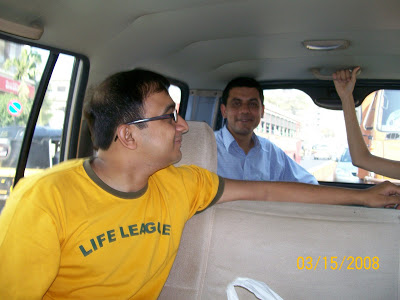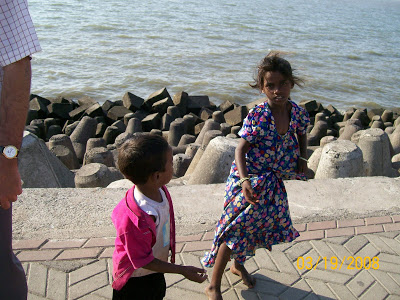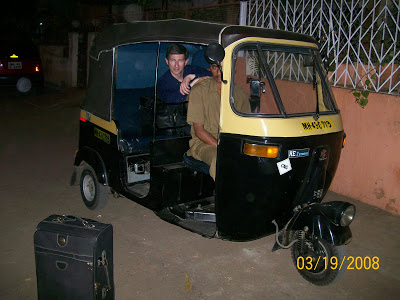Here is a condensed summary of my overall impressions of my recent trip to India. The trip was business, but I got to see a lot of country. For a full blow by blow, see my trip reports at my travel blog: India Part I and India Part II.
When I was in high school, the Men at Work song “Land Down Under” was one of my favorite songs. One line speaks of Bombay, which to a farm kid from Oklahoma was the most exotic sounding destination in the world. For me, it was always one of these mystical places like Timbuktu. Never in my wildest dreams could I have imagined then that someday I would be walking the streets of Bombay (although the name has now been returned to the original Mumbai).
The Poverty
The poverty in India is just stunning. We don’t have anything to compare it to in the West. The people that would be considered very poor in the West have it far better than the poor in India. They are literally starving to death. I once asked what happens if someone has a medical emergency in the slums. “If they have money, they live. If not, they die.”
I think in the West we just tune it out when we see it on TV. But you can’t tune it out when you drive by mile after mile after mile of people living essentially in garbage dumps. I think we treat our unwanted pets in the West with more concern than we have for a starving 2-year-old half way around the world. I was frequently asked what I was thinking about, and once I replied “What it would be like to have everyone in India experience a little of America, and everyone in America come see this.”
The Traffic
It really isn’t accurate to call it traffic. It is more appropriate to say that chaos reigns on the roads. It’s just a free-for-all out there. I would never recommend that a Westerner rent a car and attempt to drive. You will spend all of your time in a state of confusion, and you will hold up traffic while you try to figure out what to do. The constant honking (in lieu of signaling) was unnerving. For me, Hell would be having to be a cab driver in Bombay for all eternity.
The roads are shared by people, bikes, motorbikes, auto-rickshaws, and cars. I frequently observed traffic going the wrong direction, and it was quite normal to have someone turn directly across your path. We had drivers who took us from place to place, and they would pass people on blind curves and hills, and sometimes they even passed someone in the act of passing someone else. I don’t think we have a proper frame of reference in the West for the “traffic” in India; especially in the big cities.
The People
The population density is something else. I once wondered aloud just how many people I had seen on this trip. Kapil, the guy I was traveling with, said “Probably a good fraction of all the people you have ever seen in your life.” That is not an exaggeration. We traveled around the country, and with very few exceptions there were people lining the streets everywhere. Several times I would observe a crowd and wonder what was going on, but there was nothing going on. It was just a crowd. But it looked like a constant stream coming out of a major sporting event.
Despite the crowded conditions, I only saw violence once – when a man tried to drag another out of a car after a wreck. The people seem to cope quite well. Crime doesn’t seem to be nearly the problem you might expect in a city that size.
But with that many people comes a great deal of garbage. There was trash everywhere, and most of the time you could smell rotting garbage. One night we stayed well north of the city, but every once in a while my room would fill up with a garbage smell. I presumed the wind had shifted from Bombay.
Travel
It takes forever to get anywhere. You look at a place, and think “It’s only 100 miles.” 3 hours later, you still aren’t there. We spent 20 hours on the road over the course of 4 days. They don’t have rest stops and such with facilities that I could see. But the people I was traveling with never needed them. We would spend 7 hours in the car and never stop for a bathroom break. Needless to say, I limited my water intake on the trip, as I found that bathrooms were treated as a precious commodity. On a couple of occasions when I was in a meeting, I asked for the restroom and found someone standing outside of it, and a sign that said “VIPs and guests only.”
I traveled by train as well. It isn’t for everyone. If you like hot, sweaty bodies packed in like sardines (and that’s in 1st Class), then go for it. The auto-rickshaw was an interesting concept. The fuel efficiency on those things must be outrageous. They are run by a small motorcycle engine, and they sound just like a motorcycle.
Food
During the week in India, I had meat twice. The total I had was about 3 ounces. I would have guessed that I would be constantly starving, but the food is very filling, and very good. I haven’t had vegetarian like that in the West. They have a carbohydrate (usually a flat bread), a vegetable, and a protein. Rice is always part of the meal. This is one thing that I will take back with me: I plan to incorporate some of these meals into my normal diet.
Energy
I will make a separate post on the energy scene in India. I had some very interesting energy discussions while we were there, and toured a sugarcane ethanol factory. India has great potential for producing renewable energy, but with a population over 1 billion, they are unlikely to be able to export that energy in the long-term.
I asked everyone about jatropha. It was funny, because everyone had heard of it, but nobody knew where you could find it. What I was told is that the fertile land is all being used, and marginal land where one might grow jatropha has no infrastructure. Jatropha also takes a few years to mature, so that is an additional complication. My impression is that claims of jatropha in India have been wildly exaggerated.
“Hi, I’m Robert. From Dehli.”
I like to joke around, so this became one of my favorite lines when someone looked at me strangely, or I did something that perhaps was not quite expected. “It’s OK, I’m from Dehli.”
Overall, the trip was a real eye-opener for me. I mean, sure, I knew of these things, but at least for me actually seeing them first hand really sears the memory into my brain.



I’ve got a friend who just returned from India,and he said pretty much the same thing. People everywhere. Traffic congestion around the clock and no street signs at all. He also couldn’t get over the pervasive smell in the air. Something like a combination of rotting garbage and burning rubber. He just keeps saying,you have nooooooo idea how good we have it.
Yeah, the smell was there most of the time. Sometimes, it smelled like rotting garbage, but other times I could smell decaying flesh.
Your friend is right: A trip over there and you will realize how good we do have it. Life is hard there.
I’m glad you got a chance to see that. I hope that it will give you a new perspective to consider when discussing energy issues. Especially in relation to biofuels.
And it’s not just India either. I’ve lived in Africa for a while and it’s the same story, the people just look different. I think most of the world is more like India than it is like the developed countries. We’re the aberration.
Robert, the post where you talked about a Manhattan Project to go solar stuck in my mind. I’ve been reading a lot about oil shale lately. Congress grabbed most of the land containing shale back in 1901. The Green River Basin contains an estimated 1.5 trillion barrels of oil,about twice Mideast reserves. The problem is getting the oil out. The shale is a thousand feet below the surface. Maybe we should consider a “Panama Canal” approach to shale oil. A massive government effort to uncover the stuff,and then leases to companies willing and able to refine it. They claim the yield can be as high as a million barrels per acre. It seems a shame to be dependent on the whims of nutjobs like chavez when we have so much potential ourselves.
Robert – from your reactions I assume this is the first time you have travelled extensively in the undeveloped 3rd world. I had the same impressions as you did on my first trips to India and Africa, and was very thankful to be born in the US.
My views on poverty and race relations changed too. The poor in the US and in the EU live better than the upper middle class in India and Africa. In fact the poor in the US today have a better standard of living than the middle class did in the 1960s. The residents of Mumbai would gladly trade places with the poor in the US. The Nigerians working for me couldn’t understand African Americans and their complaints.
Is it just me, or does Kapil resemble a younger version of Vinod Khosla?
My impression is that claims of jatropha in India have been wildly exaggerated.
As suspected, thanks.
Maury, funny you should mention Green River.
The technology Shell has developed extracts the oil in situ, there is no need to try and uncover the stuff, just drill down to it.
Watch the enviros object to even that.
larryd,
I assume by enviros, you mean those folks who like clean air and water? Do you always generalize this much?
We’re the aberration.
Says who? Indians and Africans have it bad, mostly as a result of oppressive political systems. IMHO, they are trapped in a cycle where low expectations lead to a corrupt (or at least ineffective) government and a corrupt government leads to low expectations. Let’s hope they can break out of that (the news so far: decidedly mixed) and improve their lots.
Yeah, thank goodness we don’t have that sort of issue with our government…
Robert – from your reactions I assume this is the first time you have travelled extensively in the undeveloped 3rd world.
I have been to Turkey and Morocco, but didn’t travel extensively in the countryside as I did in India.
Cheers, Robert
So, did the Indians instill a love of cricket in you, or are you going to have to go back for that?
Thanks for the link LarryD. Green River holds somewhere between $80 and $150 trillion worth of oil at current prices,depending on whose estimate you use. I’m still in favor of uncovering the entire field,processing it,and then restoring the land. We could even turn those rocky plateaus into a giant corn field if we chose. Shell’s experiment sounds promising,but it’s only a maybe. We’ve been hearing that for decades already.
Much of RR’s commentary sounds lke Bangkok, but even worse. Outside Bangkok, in rural areas, is real poverty, though evidently even worse 30 years ago.
The Third World nations are really getting hurt by OPEC and Thug Oil.
Maury, read the article closely. Shell says they are ready to start deploying the technology now, and it’s competitive with oil down to $30/barrel.
And their technology is a lot less intrusive (not to mention less expensive), than trying to create a thousand food deep strip mine.
The current hurdle is political, and their way is more likely to pass it than your idea.
With this experience fresh in your mind, you might really appreciate three books:
Paul Collier (Director, Centre for the Study of African Economies, Oxford, 2007) The Bottom Billion: Why the Poorest Countries are Failing and What Can Be Done About It
Loyd Evans (1998). Feeding the Ten Billion: Plants and population growth
Lester Brown (Earth Policy Institute, 2005) Outgrowing the Earth: The Food Security Challenge in an Age of Falling Water Tables and Rising Temperatures
KingofKaty:
“The Nigerians working for me couldn’t understand African Americans and their complaints.”
What are those complaints, exactly?
ek – the Nigerians had a hard time understanding claims of racism, and discrimination in general. From their perspective, the US is a country of great wealth and opportunity where limits to prosperity are largely self imposed. When compared to ethnic cleansing and tribal feuds, minorities in the US have it relatively easy.
There are a lot of Nigerians in Houston. It seems that every time we took a cab out for lunch or dinner there was a Nigerian cab driver, usually a student who had overstayed his Visa. Almost all of them were working their way up and had some business on the side in addition to the cab. My Nigerian engineers would talk to the cabbie about home, you could tell they missed it but that they were all happy to be in the US.
You should the chapter on India in Guy Sorman’s “The New Wealth of Nations”.
He traveled to about three dozen different countries some years back trying to answer the question, why do some countries increase in wealth, and some do not, what are the factors that make a difference.
Larryd-
That is one heck of an article. Like I always say: Never bet against people in a relatively free, well-capitalized society.
The doomsters are wrong.
Peak Oil?
Most likely, North America (not the USA) will hit all-time crude oil production records in 2020 or so, between tar sands, shale oil and steady domestic production.
If the Mexican quite farting around Canterelli, even sooner.
I lived in a lot of developing countries as a child. I never take what I have for granted. I always feel like kissing the ground whenever I return to the USA.
OT (H/T Instapundit) Air Force prods Aids Coal-To-Fuel Plans
The Air Force wants to build at its Malmstrom base in central Montana the first piece of what it hopes will be a nationwide network of facilities that would convert domestic coal into cleaner-burning synthetic fuel.
Air Force officials said the plants could help neutralize a national security threat by tapping into the country’s abundant coal reserves. And by offering itself as a partner in the Malmstrom plant, the Air Force hopes to prod Wall Street investors – nervous over coal’s role in climate change – to sink money into similar plants nationwide.
The Air Force is, of course, worried about reliability of supply.
The Air Force is, of course, worried about reliability of supply.
One way to increase reliability: diversification.